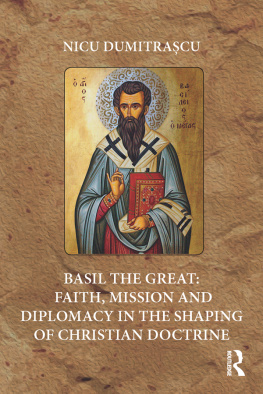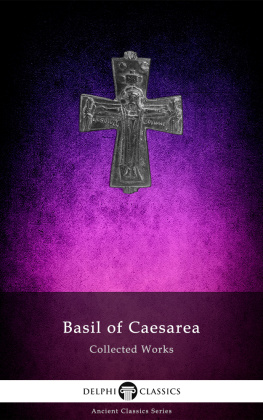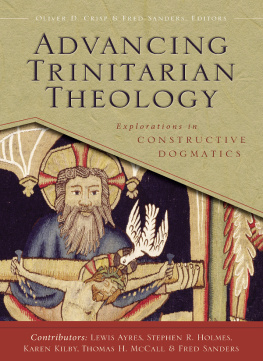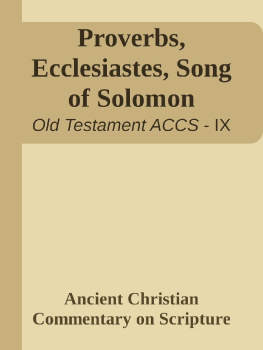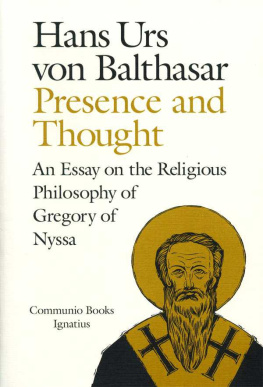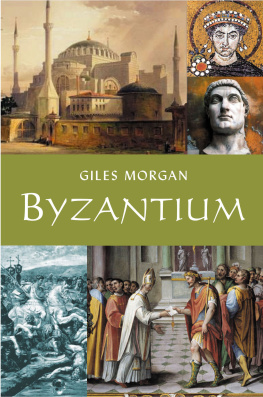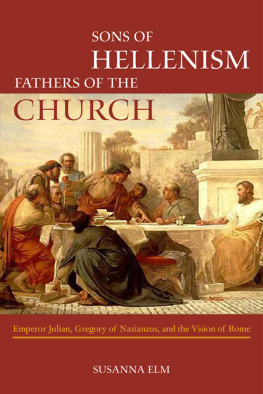Basil the Great: Faith, Mission
and Diplomacy in the Shaping
of Christian Doctrine
Regarded as one of the three hierarchs or pillars of orthodoxy along with Gregory of Nazianzus and John Chrysostom, Basil is a key figure in the formative process of Christianity in the fourth century. While his role in establishing Trinitarian terminology, as well as his function in shaping monasticism, his social thought and even his contribution to the evolution of liturgical forms have been the focus of research for many years, there are few studies which centre on his political thought. Basil played a major role in the political and religious life between Cappadocia and Armenia and was a key figure in the tumultuous relationship between Church and State in Late Antiquity. He was a great religious leader and a gifted diplomat, and developed a special relationship with Emperor Valens and other high imperial officials.
Nicu Dumitracu is currently professor of Patristics, Mission and Ecumenism at the Faculty of Orthodox Theology Episcop Dr. Vasile Coman, University of Oradea, Romania. He is widely published in several journals worldwide. His most recent books include Christian Family and Contemporary Society (2014), and The Ecumenical Legacy of the Cappadocians (Collected Essays) (2015).
Basil the Great: Faith,
Mission and Diplomacy
in the Shaping of
Christian Doctrine
Nicu Dumitracu
First published 2018
by Routledge
2 Park Square, Milton Park, Abingdon, Oxon OX14 4RN
and by Routledge
711 Third Avenue, New York, NY 10017
Routledge is an imprint of the Taylor & Francis Group, an informa business
2018 Nicu Dumitracu
The right of Nicu Dumitracu to be identified as author of this work has been asserted by him in accordance with sections 77 and 78 of the Copyright, Designs and Patents Act 1988.
All rights reserved. No part of this book may be reprinted or reproduced or utilised in any form or by any electronic, mechanical, or other means, now known or hereafter invented, including photocopying and recording, or in any information storage or retrieval system, without permission in writing from the publishers.
Trademark notice: Product or corporate names may be trademarks or registered trademarks, and are used only for identification and explanation without intent to infringe.
British Library Cataloguing in Publication Data
A catalogue record for this book is available from the British Library
Library of Congress Cataloging in Publication Data
Names: Dumitracu, Nicu, author.
Title: Basil the Great : faith, mission, and diplomacy in the shaping of Christian doctrine / Nicu Dumitracu
Description: New York : Routledge, 2018. | Includes bibliographical references and index.
Identifiers: LCCN 2017045936| ISBN 9781472485861 (hardback : alk. paper) | ISBN 9781315568775 (ebook)
Subjects: LCSH: Basil, Saint, Bishop of Caesarea, approximately 329379.
Classification: LCC BR65.B36 D86 2018 | DDC 270.2092dc23
LC record available at https://lccn.loc.gov/2017045936
ISBN: 978-1-4724-8586-1 (hbk)
ISBN: 978-1-315-56877-5 (ebk)
Typeset in Times New Roman
by Keystroke, Neville Lodge, Tettenhall, Wolverhampton
Contents
PART 1
St Basil and Emperor Valens: dignity versus authority
PART 2
St Basil, St Nerses and Armenia: mission and church diplomacy
PART 3
St Basil and the art of diplomacy: meetings, methods and correspondence
PART 4
St Basil as model for a leader of Christian opinion: dignity, humility and culture
St Basil the Great is chiefly remembered for two things: first, for his defence of the full Nicaean faith; and second, for his insistence upon the social and philanthropic service rendered by monasticism. In the present book, Fr Nicu Dumitracu, Professor at the University of Oradea, Romania, examines an aspect of Basils life that is less well known, yet of great interest: his involvement in missionary work, and more especially his relations with Armenia. Basil is seen here not only as an eminent theologian but as a bridge-builder and diplomat, as a church leader of firm principles but also of moderation, strict, yet at the same time, gentle.
Nicu Dumitracu is already well known in the field of patristic studies through the excellent collective volume that he has edited, The Ecumenical Legacy of the Cappadocians, to which he himself contributed a sensitive account of St Basils friendship with St Gregory of Nazianzus. Here he enters more deeply into the personality and ministry of Basil. In convincing terms, he shows us how the Archbishop of Caesarea combined dignity with humility, holy fear and wide-ranging generosity.
This is a significant addition to Basilian studies, and should be welcomed by scholars of patristics, church history, and their students too.
Metropolitan Kallistos of Diokleia
Strategies for communion
Regarded alongside Gregory of Nazianzus and John Chrysostom as one of the three hierarchs or pillars of orthodoxy, Basil is a key figure in the shaping of Christianity in the fourth century. While his role in establishing Trinitarian terminology has been the focus of research for many years as well as his function in shaping monasticism, in his social thought and even in his contribution to the evolution of liturgical forms, there are few studies which throw light upon his political thought, this being understood as regarding general politics within the Roman empire of his time, in Basils problematic and atypical relationship with the emperor, Valens, but also in connection to Church politics.
Against this background, we have to consider Professor Dumitracus book and his contribution to contemporary scholarship. He is deemed to be one of the foremost Patristic scholars in Eastern Europe and internationally well known as his various articles and books bear witness. In the present work, he focuses on Basils diplomatic skills and strategies in the context of the presence of an emperor opposed to the Nicaean party and launching policies against this. Dumitracu privileges Basils letters as a genuine source for his strategies of impacting political power in favour of his own views. A highly significant contribution is the authors insights into the relevance of the Armenian mission carried out by the Cappadocians on behalf of the emperor in the years 372373.
Dumitracu articulates his study in four parts. In the first, he deals with the Cappadocian bishops confrontation with Valens in Epiphany 372 and what was at play. He is correct in seeing in this event as a highly significant one, a paradigmatic case of the (difficult) interaction between political and ecclesiastical powers. The difficulties and tensions that precede this conflictive meeting are analysed in detail as well as the consequences of this unexpected understanding of the leaders of opposition. The main consequence is the topic of the second chapter that deals with Basils relevant mission (in the name of the emperor!) to Armenia, which Dumitracu analyses in parallel with the two missions to Constantinople carried out by the Armenian catholicos Nerses a few years before (358360). Nerses was a highly prominent leader operating within a conflictive relationship between church and state in Armenia between 353373. The possibility of the influence of Basils Basiliads upon social institutions created by Nerses in Armenia after the year 368, are also taken here into consideration.

